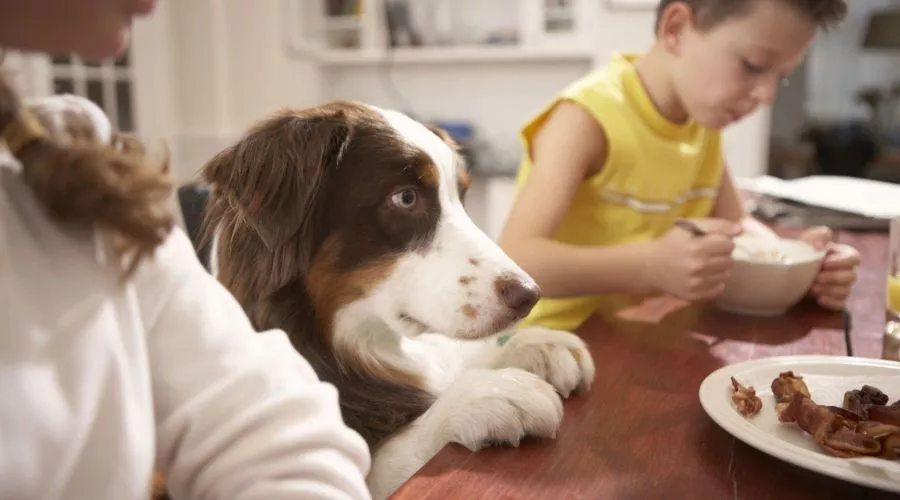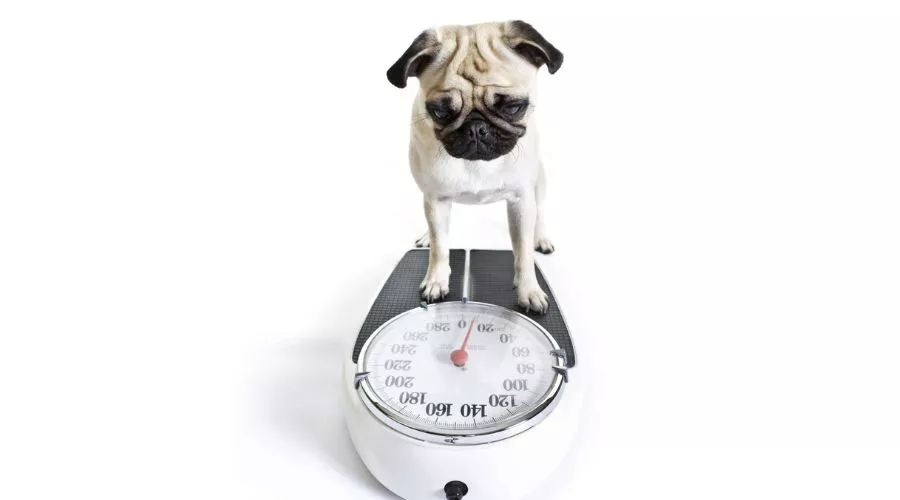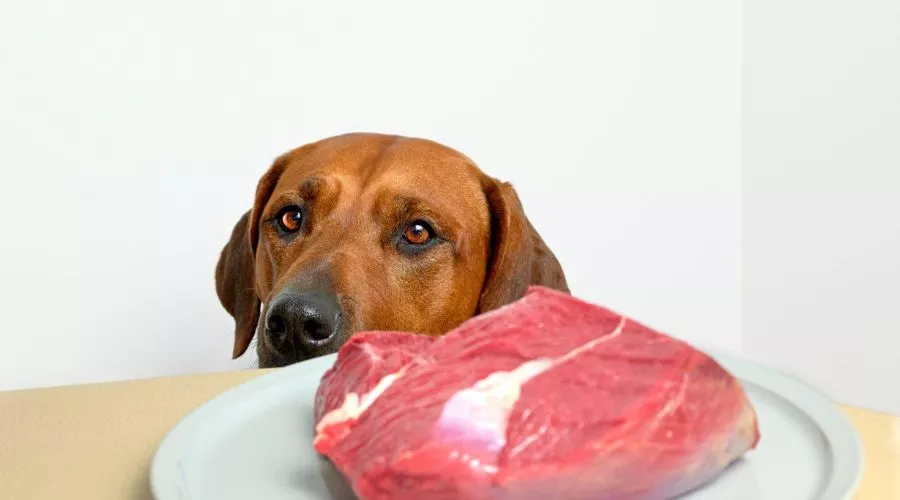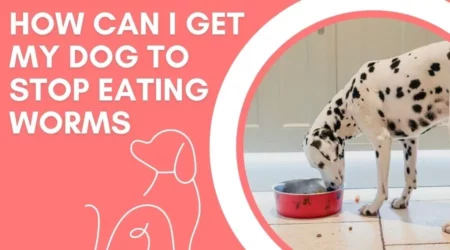Have you ever wondered how long a dog can go without food?
While it’s not something you would ever want to put your beloved pooch through, it’s essential to be aware of the potential risks involved.
A dog’s ability to survive without food for an extended period depends on various factors, including breed, age, size, and health.
Generally speaking, most healthy adult dogs can go up to five days without eating, though some can survive for as long as two weeks.
I’ll explore the effects of fasting on a canine’s body, how to monitor your pup’s nutritional needs safely, and what to do if your dog is unable to eat for a prolonged period. ↗
What are the effects of fasting on a dog’s body?

When an animal goes without food, its body begins to break down and consume its muscle and fat for fuel.
A dog’s internal organs will also suffer damage as the body’s metabolic rate increases and its internal temperature rises.
Unfortunately, the longer a dog can eat, the more serious the consequences will be. Signs of nutritional distress include lethargy, dehydration, loss of coordination, weakness, and balance issues.
Dogs severely underweight or with existing health or nutritional issues may require immediate veterinary care.
In extreme cases, a dog may also experience a drop in blood sugar (hypoglycemia). Severe hypoglycemia can result in seizures, coma, and even death if left untreated.
How to monitor your pup’s nutritional needs

Talk to your vet if you’re unsure how much or how often to feed your dog. Most vets recommend feeding puppies and dogs twice a day. Regular feedings help your pup maintain a healthy weight while providing all the nutrients they need.
If you have an elderly dog with a limited appetite or a pup with a sensitive stomach, consider feeding them smaller portions more frequently. You can also supplement your dog’s diet with nutritional supplements.
- –Regular weigh-ins: If your dog is overweight, measure their food intake regularly to prevent obesity and metabolic diseases. If you have an underweight pup, consult your vet for advice on increasing their caloric intake.
- – Analyze your dog’s stool: This is a great way to track your pup’s nutritional intake and identify potential issues. For example, a lack of fiber in your pup’s diet can lead to constipation. If your dog has difficulty pooping, talk to your vet about feeding them dietary fiber supplements.
- – Monitor your dog’s energy levels: This is especially important if your dog is elderly. If you notice a significant drop in your elderly dog’s energy levels, consult your vet to see if they need a nutritional boost.
Factors that affect how long a dog can go without food

Several factors can affect how long your dog can safely go without food. Breed, age, size, and health are all important considerations when determining the potential duration of a dog’s fast.
Breed: Smaller breeds with a higher metabolism, like Beagles, Jack Russell Terriers, and Chihuahuas, can quickly go up to five days without food.
Larger breeds, like Great Danes, German Shepherds, and Labradors, can survive for up to two weeks without eating. Age: Puppies and elderly dogs require more nutritional support than adult dogs.
As a general rule, a puppy’s and an elderly dog’s fasting timeline should not exceed 24 hours. Size: A giant dog with a higher metabolic rate can go longer without food than a smaller dog. Health:
Dogs with weakened immune systems, diabetes, liver and kidney conditions, limited mobility, and other health issues may need to eat more frequently than a healthy dog.
Risks of prolonged fasting

While fasting for a short period has health benefits, letting your dog go too long without eating is dangerous.
If your pup goes more than three days without food, they risk serious health complications.
If your dog cannot eat or can only eat very small amounts of food, seek immediate veterinary attention.
Dogs that go too long without food risk developing life-threatening metabolic acidosis, which can lead to organ failure.
How to safely re-introduce food to a fasting dog

If your dog has gone too long without eating, you can attempt to re-introduce food slowly. If your dog has gone more than 24 hours without eating but less than three days, feed them a small meal of their usual brand and amount.
If your dog has gone more than three days without food, consult your vet before re-feeding because you may need to administer an electrolyte solution.
If your dog cannot eat or can only eat very small amounts of food, seek immediate veterinary attention.
What to do if your dog is unable to eat
If your dog cannot eat, it’s essential to carefully monitor their fluid intake and provide ample amounts of clean water.
In addition to plenty of water, dogs can be fed intravenously (IV) if they cannot keep down food or fluids.
If your dog has gone too long without eating, it’s essential to get them to a vet immediately. If your dog cannot eat, you will likely need to take them to the vet for emergency treatment.
If your dog has gone too long without eating, it’s essential to get them to a vet immediately. If your dog cannot eat or can only eat very small amounts of food, seek immediate veterinary attention.
FAQS
Can a dog go without eating for 12 hours?
Yes, a dog can go without eating for 12 hours without significant health problems. However, it is essential to note that while a dog can go without food for up to 12 hours, this should not be a regular habit. Regularly skipping meals can cause your dog to become malnourished and can lead to various health issues, such as digestive issues, weight loss, and even organ failure. It is also essential to consider your dog’s age when determining if it is safe to skip meals. Puppies under six months old should not be left without food for more than 5 hours. For adult dogs, if you go without food for more than 12 hours, you should try to provide them with a smaller meal the night before or small snacks throughout the day. When feeding your dog, it is vital to provide them with balanced and nutritious meals. This will ensure that they get all the nutrients they need and help prevent any health issues caused by skipping meals. If you are unsure what food to feed your dog, you should consult your veterinarian.
How long is too long for a dog not to eat?
if your dog goes more than 24 hours without eating, that’s a sign that something is wrong, and you should consult with your veterinarian. There are a few things that could be causing your dog not to eat. One of the most common is an upset stomach or nausea. If your dog has recently been exposed to something that might have made them sick, such as eating something they shouldn’t have or coming into contact with a foreign substance, they may feel nauseous. This can cause them to lose their appetite. Another possibility is that your dog is having dental problems. If their teeth are in bad shape, they may not be able to eat correctly or even be in pain when they try to eat something. Mouth inflammation, mouth infections, or gum diseases could also cause this. If your dog is not eating and it has been more than 24 hours, it’s best to take them to the vet right away to check out the underlying cause. The sooner you take them in, the better their chances of making a full recovery





